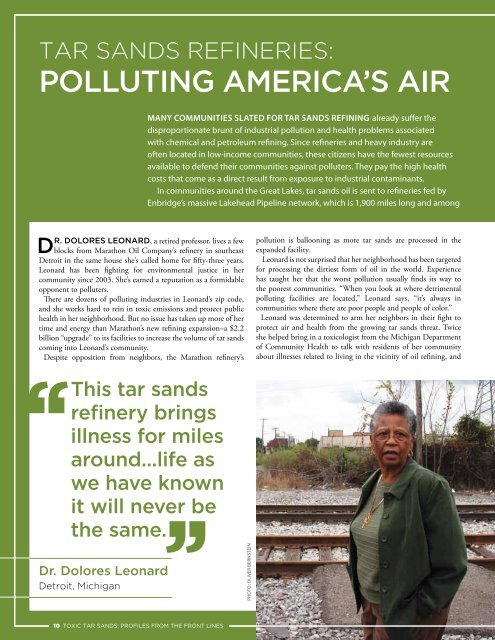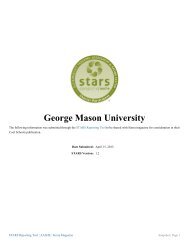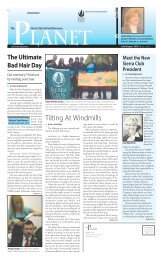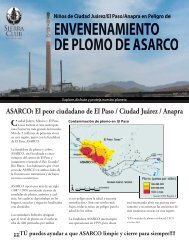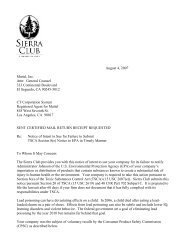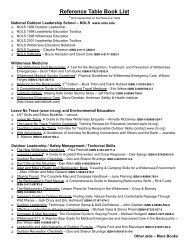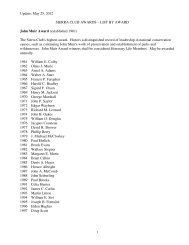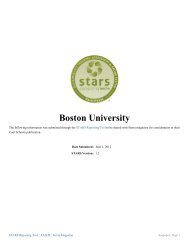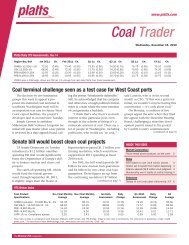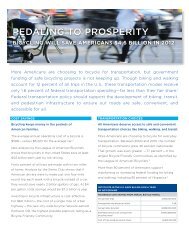Toxic Tar Sands: Profiles from the Front Lines - Sierra Club
Toxic Tar Sands: Profiles from the Front Lines - Sierra Club
Toxic Tar Sands: Profiles from the Front Lines - Sierra Club
You also want an ePaper? Increase the reach of your titles
YUMPU automatically turns print PDFs into web optimized ePapers that Google loves.
TAR SANDS REFINERIES:<br />
pollUting AMericA’s Air<br />
dr. dolores leonArd, a retired professor, lives a few<br />
blocks <strong>from</strong> Marathon Oil Company’s refinery in sou<strong>the</strong>ast<br />
Detroit in <strong>the</strong> same house she’s called home for fifty-three years.<br />
Leonard has been fighting for environmental justice in her<br />
community since 2003. She’s earned a reputation as a formidable<br />
opponent to polluters.<br />
There are dozens of polluting industries in Leonard’s zip code,<br />
and she works hard to rein in toxic emissions and protect public<br />
health in her neighborhood. But no issue has taken up more of her<br />
time and energy than Marathon’s new refining expansion–a $2.2<br />
billion “upgrade” to its facilities to increase <strong>the</strong> volume of tar sands<br />
coming into Leonard’s community.<br />
Despite opposition <strong>from</strong> neighbors, <strong>the</strong> Marathon refinery’s<br />
this tar sands<br />
refinery brings<br />
illness for miles<br />
around...life as<br />
we have known<br />
it will never be<br />
<strong>the</strong> same.<br />
dr. dolores leonard<br />
Detroit, Michigan<br />
10 TOXIC TAR SANDS: PROFILES FROM THE FRONT LINES<br />
many COmmuniTieS SlaTed fOr <strong>Tar</strong> SandS refining already suffer <strong>the</strong><br />
disproportionate brunt of industrial pollution and health problems associated<br />
with chemical and petroleum refining. since refineries and heavy industry are<br />
often located in low-income communities, <strong>the</strong>se citizens have <strong>the</strong> fewest resources<br />
available to defend <strong>the</strong>ir communities against polluters. They pay <strong>the</strong> high health<br />
costs that come as a direct result <strong>from</strong> exposure to industrial contaminants.<br />
In communities around <strong>the</strong> Great Lakes, tar sands oil is sent to refineries fed by<br />
Enbridge’s massive Lakehead Pipeline network, which is 1,900 miles long and among<br />
PHoTo: oLIvER BERNsTEIN<br />
pollution is ballooning as more tar sands are processed in <strong>the</strong><br />
expanded facility.<br />
Leonard is not surprised that her neighborhood has been targeted<br />
for processing <strong>the</strong> dirtiest form of oil in <strong>the</strong> world. Experience<br />
has taught her that <strong>the</strong> worst pollution usually finds its way to<br />
<strong>the</strong> poorest communities. “When you look at where detrimental<br />
polluting facilities are located,” Leonard says, “it’s always in<br />
communities where <strong>the</strong>re are poor people and people of color.”<br />
Leonard was determined to arm her neighbors in <strong>the</strong>ir fight to<br />
protect air and health <strong>from</strong> <strong>the</strong> growing tar sands threat. Twice<br />
she helped bring in a toxicologist <strong>from</strong> <strong>the</strong> Michigan Department<br />
of Community Health to talk with residents of her community<br />
about illnesses related to living in <strong>the</strong> vicinity of oil refining, and


